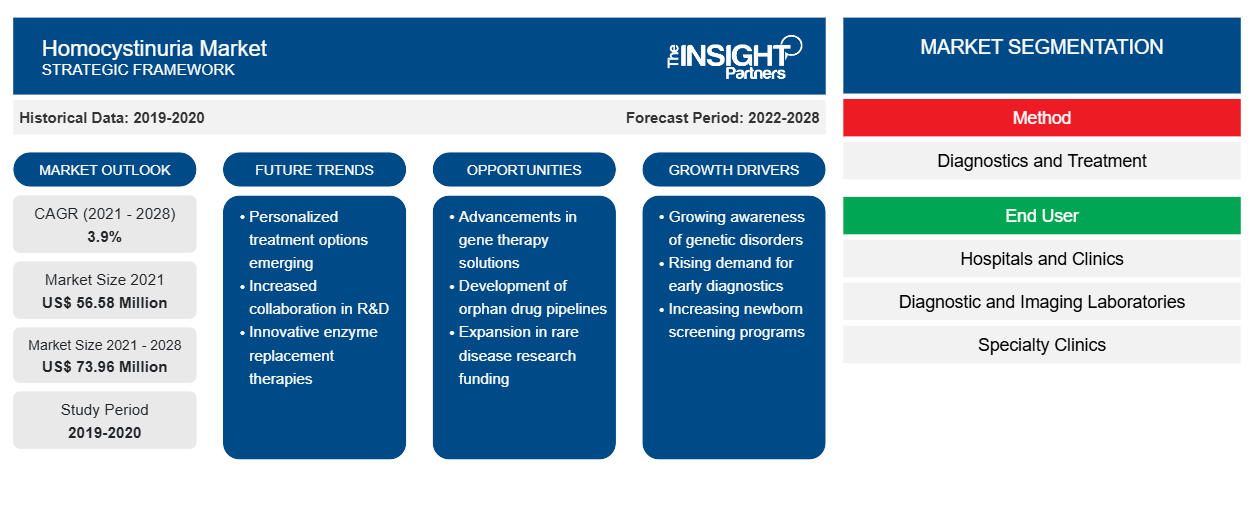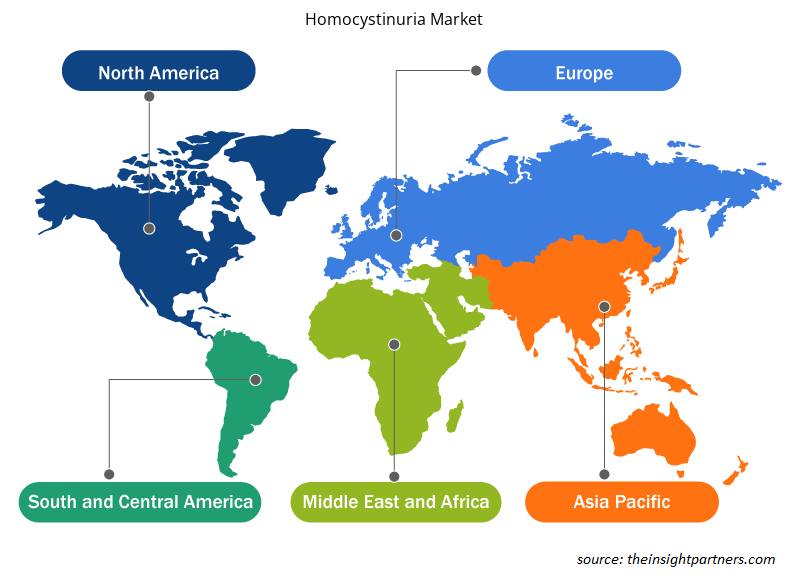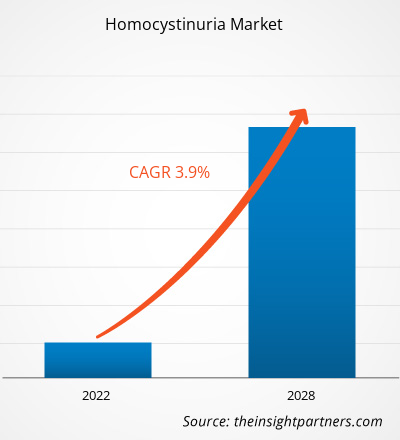The homocystinuria market is projected to reach US$ 73.96 million by 2028 from US$ 56.58 million in 2021; it is estimated to grow at a CAGR of 3.9% during 2021–2028.
Homocystinuria is a genetic condition in which the body is unable to correctly digest certain protein building blocks (amino acids). Homocystinuria comes in a variety of types, each with its own set of signs and symptoms as well as a hereditary aetiology. Nearsightedness (myopia), dislocation of the lens at the front of the eye, a greater risk of irregular blood clotting, and brittle bones prone to fracture (osteoporosis) or other skeletal abnormalities define the most prevalent form of homocystinuria. Some of the people who are impacted also have developmental delays and learning difficulties.
Customize This Report To Suit Your Requirement
You will get customization on any report - free of charge - including parts of this report, or country-level analysis, Excel Data pack, as well as avail great offers and discounts for start-ups & universities
Homocystinuria Market: Strategic Insights

- Get Top Key Market Trends of this report.This FREE sample will include data analysis, ranging from market trends to estimates and forecasts.
You will get customization on any report - free of charge - including parts of this report, or country-level analysis, Excel Data pack, as well as avail great offers and discounts for start-ups & universities
Homocystinuria Market: Strategic Insights

- Get Top Key Market Trends of this report.This FREE sample will include data analysis, ranging from market trends to estimates and forecasts.
The growth of the homocystinuria market is attributed to the rising deficiencies of vitamin B6 and Vitamin B12 and the growing prevalence of inherited metabolic disorders. However, the lack of awareness about various rare disorders and inherited metabolic disorders hampers the market growth.
Market Insights
Rising Vitamin B6 and Vitamin B12 Deficiencies Drive Homocystinuria Market
The increase in vitamin B6 and Vitamin B12 deficiencies patterns leads to several disorders such as anemia, megaloblastic anemia, microcytic anemia, and some kind of metabolic disorders, which is expected to boost the market growth during the forecast period. As vitamin B6 therapy is believed to be an effective therapy against homocystinuria, the deficiency of this vitamin may worsen the condition. Pyridoxine (vitamin B6) acts as a cofactor of beta-synthase and acts as a chaperone for stabilizing several missense mutations. Some of the patients with homocystinuria respond well to pyridoxine therapy, and it helps to lower the homocysteine levels, thereby providing relief from the condition. Thus, vitamin B6 is considered vital in managing homocystinuria as a limited number of treatments are available for curing the condition. The deficiency of this enzyme leads to anemia and microcytic anemia. The rising prevalence of anemia is expected to spur market growth during the forecast period. For instance, according to the World Health Organization, anemia affects over 1.62 billion populations, i.e., 24.8% of the population. The major causes of anemia are improper diet and deficiencies of vitamins such as B6, B9, and B12. Predominantly, vitamin B6 deficiency is a leading cause of anemia. Thus, an increase in cases of vitamin B6 deficiency and a high prevalence of disorders associated with its deficiency is expected to support market growth during the forecast period.
Method-Based Insights
The global homocystinuria market, based on method, is bifurcated into treatment and diagnostics. The treatment segment held a larger share of the market in 2021. Moreover, the same segment is anticipated to register a higher CAGR in the market during the forecast period due to the incumbent usage of treatment and increasing research and development of new treatments for homocystinuria.
Homocystinuria Market Regional Insights
The regional trends and factors influencing the Homocystinuria Market throughout the forecast period have been thoroughly explained by the analysts at Insight Partners. This section also discusses Homocystinuria Market segments and geography across North America, Europe, Asia Pacific, Middle East and Africa, and South and Central America.

- Get the Regional Specific Data for Homocystinuria Market
Homocystinuria Market Report Scope
| Report Attribute | Details |
|---|---|
| Market size in 2021 | US$ 56.58 Million |
| Market Size by 2028 | US$ 73.96 Million |
| Global CAGR (2021 - 2028) | 3.9% |
| Historical Data | 2019-2020 |
| Forecast period | 2022-2028 |
| Segments Covered |
By Method
|
| Regions and Countries Covered | North America
|
| Market leaders and key company profiles |
Homocystinuria Market Players Density: Understanding Its Impact on Business Dynamics
The Homocystinuria Market is growing rapidly, driven by increasing end-user demand due to factors such as evolving consumer preferences, technological advancements, and greater awareness of the product's benefits. As demand rises, businesses are expanding their offerings, innovating to meet consumer needs, and capitalizing on emerging trends, which further fuels market growth.
Market players density refers to the distribution of firms or companies operating within a particular market or industry. It indicates how many competitors (market players) are present in a given market space relative to its size or total market value.
Major Companies operating in the Homocystinuria Market are:
- BASF SE
- HUAZHONG PHARMACEUTICAL
- Pfizer Inc.
- MYLAN N.V
- Aeglea BioTherapeutics
Disclaimer: The companies listed above are not ranked in any particular order.

- Get the Homocystinuria Market top key players overview
End-User-Based Insights
The global homocystinuria market, based on end-user, is segmented into diagnostics and imaging laboratories, hospitals and clinics, specialty clinics, and academic and research institutes. In 2021, the diagnostics and imaging laboratories segment held the largest share of the market. Moreover, the segment is expected to register the highest CAGR of 4.2% during 2021–2028 due to the rising diagnosis of inherited metabolic disorders in diagnostics and imaging laboratories.
Product launches and approvals are commonly adopted strategies by companies to expand their global footprints and product portfolios. Moreover, the homocystinuria market players focus on the partnership strategy to enlarge their clientele, which, in turn, permits them to maintain their brand name across the world.
The report segments homocystinuria market as follows
Homocystinuria Market – by Method
- Treatment
- Pyridoxine
- Betaine
- Others
- Diagnostics
- Genetic Testing
- Amino Acid Screening Test
- Liver Enzyme Test
- Others
Homocystinuria Market – by End User
- Hospitals and Clinics
- Diagnostic and Imaging Laboratories
- Specialty Clinics
- Academic and Research Institutes
Homocystinuria Market – by Geography
- North America
- US
- Canada
- Mexico
- Europe
- UK
- Germany
- France
- Italy
- Spain
- Rest of Europe
- Asia Pacific
- China
- Japan
- India
- Australia
- South Korea
- Rest of Asia Pacific
- Middle East and Africa
- UAE
- Saudi Arabia
- South Africa
- Rest of Middle East and Africa
- South and Central America
- Brazil
- Argentina
- Rest of South and Central America
Company Profiles
- BASF SE
- HUAZHONG PHARMACEUTICAL
- Pfizer Inc.
- MYLAN N.V
- Aeglea BioTherapeutics
- Amino GMBH
- KAO Corporation
- DSM Corporation
- Orphan Technologies
- Fresenius Kabi AG
Frequently Asked Questions
Which is the potential market for the Homocystinuria in terms of region??
The Asia Pacific region is expected to be the fastest-growing region among all other regions. The market in this region is expected to grow significantly in countries such as, China, Japan and India. The market is driven by increase in prevalence of inherited metabolic disorders, rise in government initiatives to manage rare diseases across the region along with increase in diagnostic tests across the region such as new born screening test etc. Therefore, the region holds huge potential for the homocystinuria market players to grow during the forecast period.
What does Homocystinuria mean?
Homocystinuria is an inherited disorder in which the body is unable to process certain building blocks of proteins (amino acids) properly. There are multiple forms of homocystinuria, which are distinguished by their signs and symptoms and genetic cause. The most common form of homocystinuria is characterized by nearsightedness (myopia), dislocation of the lens at the front of the eye, an increased risk of abnormal blood clotting, and brittle bones that are prone to fracture (osteoporosis) or other skeletal abnormalities. Some affected individuals also have developmental delay and learning problems.
What are the driving factors for the Homocystinuria market across the globe?
The growth of the Homocystinuria market is mainly attributed to factors such as the increasing prevalence of inherited metabolic disorders coupled with rise in vitamin B6 and Vitamin B12 deficiencies. However, the lack of awareness about various rare disorders and inherited metabolic disorders is hindering the market growth.
What is the market CAGR value of Homocystinuria market during forecast period?
The global Homocystinuria market is expected to reach US$ 73,960.22 thousand by 2028 from US$ 56,589.20 thousand in 2021; it is estimated to grow at a CAGR of 3.9% during 2021-2028.
What are future trends of Homocystinuria market?
Emergence of human enzyme therapeutics and enzyme replacement therapy to treat rare disorders is one of the future trends of homocystinuria market. Enzyme replacement therapy and enzyme therapeutics is a type of novel drug therapy in which therapeutic enzymes are used to treat chronic and life-threatening diseases such as cancer, idiosyncratic disorders, and rare disorders. Furthermore, if an enzyme is not functioning properly in the body, then enzyme replacement therapy is used for replacing the enzyme that is deficient in the body. Enzymes have a predominant role in pharmaceutical industries and drug development as they treat various disorders. The advancements in the field of protein technology, recombinant DNA technology, enzyme immobilization, and nanotechnology have provided a solid platform for the use of enzymes in the treatment of various disorders.
- Historical Analysis (2 Years), Base Year, Forecast (7 Years) with CAGR
- PEST and SWOT Analysis
- Market Size Value / Volume - Global, Regional, Country
- Industry and Competitive Landscape
- Excel Dataset
Testimonials
I wish to appreciate your support and the professionalism you displayed in the course of attending to my request for information regarding to infectious disease IVD market in Nigeria. I appreciate your patience, your guidance, and the fact that you were willing to offer a discount, which eventually made it possible for us to close a deal. I look forward to engaging The Insight Partners in the future, all thanks to the impression you have created in me as a result of this first encounter.
DR CHIJIOKE ONYIA, MANAGING DIRECTOR, PineCrest Healthcare Ltd.The Insight Partners delivered insightful, well-structured market research with strong domain expertise. Their team was professional and responsive throughout. The user-friendly website made accessing industry reports seamless. We highly recommend them for reliable, high-quality research services
Yukihiko Adachi CEO, Deep Blue, LLC.Reason to Buy
- Informed Decision-Making
- Understanding Market Dynamics
- Competitive Analysis
- Customer Insights
- Market Forecasts
- Risk Mitigation
- Strategic Planning
- Investment Justification
- Identifying Emerging Markets
- Enhancing Marketing Strategies
- Boosting Operational Efficiency
- Tracking Industry Innovations
- Aligning with Regulatory Trends
Yes! We provide a free sample of the report, which includes Report Scope (Table of Contents), report structure, and selected insights to help you assess the value of the full report. Please click on the "Download Sample" button or contact us to receive your copy.
Absolutely — analyst assistance is part of the package. You can connect with our analyst post-purchase to clarify report insights, methodology or discuss how the findings apply to your business needs.
Once your order is successfully placed, you will receive a confirmation email along with your invoice.
• For published reports: You’ll receive access to the report within 4–6 working hours via a secured email sent to your email.
• For upcoming reports: Your order will be recorded as a pre-booking. Our team will share the estimated release date and keep you informed of any updates. As soon as the report is published, it will be delivered to your registered email.
We offer customization options to align the report with your specific objectives. Whether you need deeper insights into a particular region, industry segment, competitor analysis, or data cut, our research team can tailor the report accordingly. Please share your requirements with us, and we’ll be happy to provide a customized proposal or scope.
The report is available in either PDF format or as an Excel dataset, depending on the license you choose.
The PDF version provides the full analysis and visuals in a ready-to-read format. The Excel dataset includes all underlying data tables for easy manipulation and further analysis.
Please review the license options at checkout or contact us to confirm which formats are included with your purchase.
Our payment process is fully secure and PCI-DSS compliant.
We use trusted and encrypted payment gateways to ensure that all transactions are protected with industry-standard SSL encryption. Your payment details are never stored on our servers and are handled securely by certified third-party processors.
You can make your purchase with confidence, knowing your personal and financial information is safe with us.
Yes, we do offer special pricing for bulk purchases.
If you're interested in purchasing multiple reports, we’re happy to provide a customized bundle offer or volume-based discount tailored to your needs. Please contact our sales team with the list of reports you’re considering, and we’ll share a personalized quote.
Yes, absolutely.
Our team is available to help you make an informed decision. Whether you have questions about the report’s scope, methodology, customization options, or which license suits you best, we’re here to assist. Please reach out to us at sales@theinsightpartners.com, and one of our representatives will get in touch promptly.
Yes, a billing invoice will be automatically generated and sent to your registered email upon successful completion of your purchase.
If you need the invoice in a specific format or require additional details (such as company name, GST, or VAT information), feel free to contact us, and we’ll be happy to assist.
Yes, certainly.
If you encounter any difficulties accessing or receiving your report, our support team is ready to assist you. Simply reach out to us via email or live chat with your order information, and we’ll ensure the issue is resolved quickly so you can access your report without interruption.















The List of Companies - Homocystinuria Market
- BASF SE
- HUAZHONG PHARMACEUTICAL
- Pfizer Inc.
- MYLAN N.V
- Aeglea BioTherapeutics
- Amino GMBH
- KAO Corporation
- DSM Corporation
- Orphan Technologies
- Fresenius Kabi AG.






 Get Free Sample For
Get Free Sample For